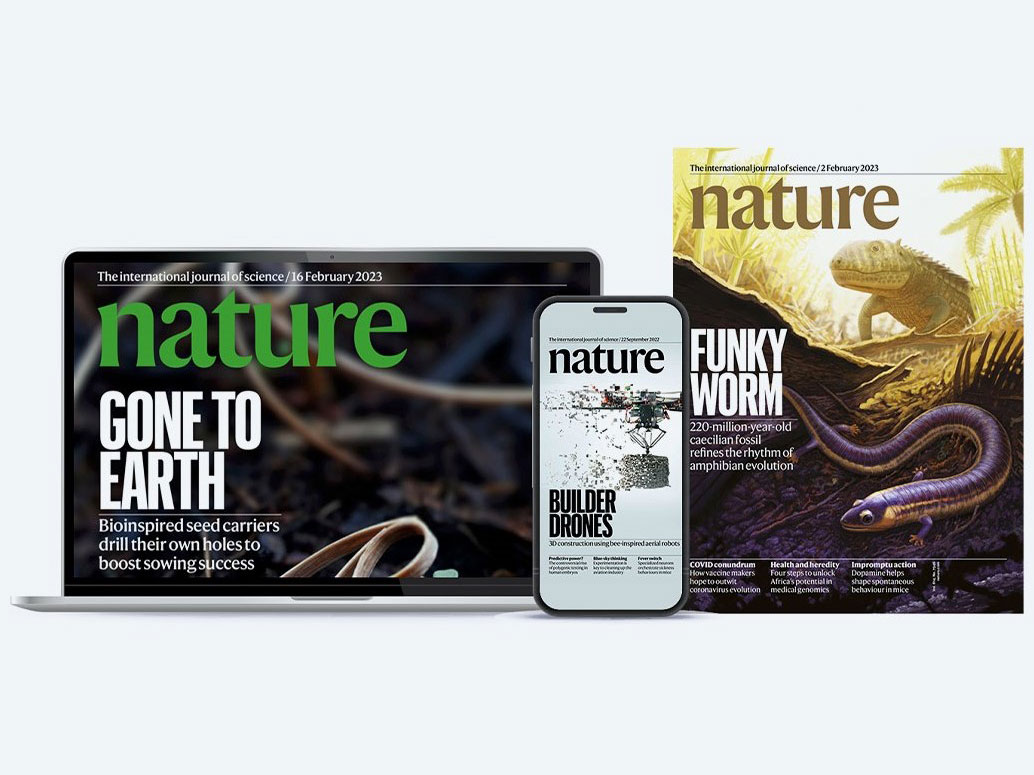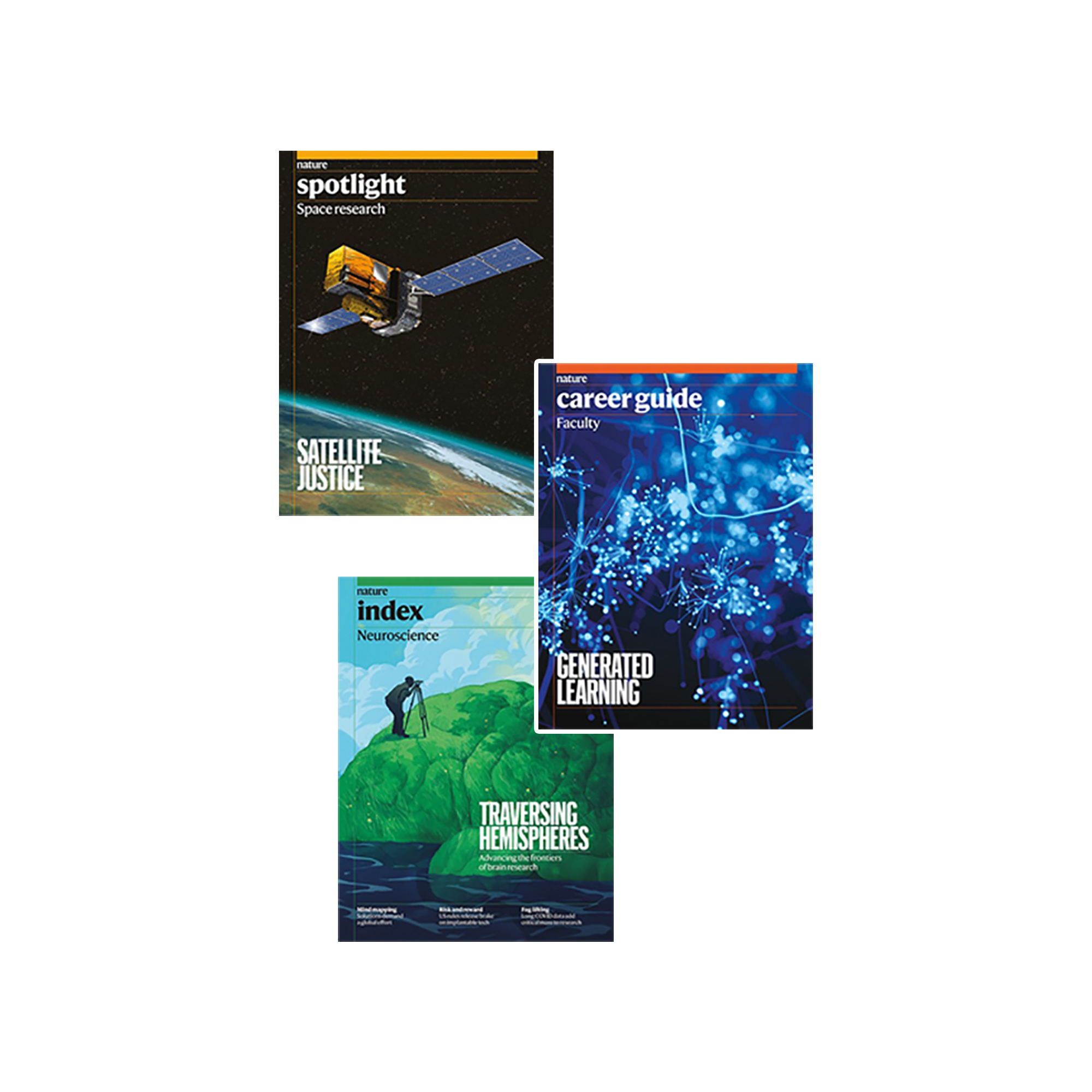Advertise in Nature journal special features in 2025
Promote your organization’s scientific products, research, and recruitment by advertising in Nature’s 2025 special features — contact us to book!
Reach Nature readers and position yourself as a thought leader in your field and an employer of choice, alongside the Nature brand.

Book Your Spot
- Decide which of our 2025 special features you want to advertise against — view the topics below.
- Choose whether to run display advertising and/or branded content.
- Display ads build critical awareness of your research, employer brand, job vacancies, products, or events.
- Branded content uses compelling storytelling to engage Nature audiences with your message. Your article can be written by our award-winning custom media team or supplied by your organization.
- Book with us before the booking deadlines detailed in the 2025 calendar.
There are 3 varieties of special feature that you can advertise in — all published in Nature:
- Spotlights: profiling a specific area of scientific interest.
- Nature Index supplements: based on data in the Nature Index.
- Career Guides from Nature Careers: helping scientists around the world with job-hunting and career advice.

2025 Nature special features calendar:
View the topics in more detail.
| Publication date in 2025 | Nature special feature and topic | Booking deadline for branded content (print and online) | Booking deadline for branded content (online only) | Booking deadline for advertiser-supplied branded content | Booking deadline for display ad (submission of PDF) |
|---|---|---|---|---|---|
| 20 March | Nature Index: Energy | 27 November 2024 | 6 January | 10 January | 7 March |
| 17 April | Spotlight: Spain | 27 January | 7 February | 18 February | 2 April |
| 24 April | Nature Index: Cancer | 9 December 2024 | 10 February | 25 February | 9 April |
| 29 May | Spotlight: Singapore | 4 March | 20 March | 1 April | 14 May |
| 12 June | Career Guide: Texas | 19 March | 3 April | 15 April | 28 May |
| 19 June | Spotlight: Canada | 26 March | 9 April | 22 April | 4 June |
| 26 June | Nature Index: Corporate in Science (Science Inc) | 28 March | 16 April | 29 April | 11 June |
| 21 August | Spotlight: Climate change | 27 May | 12 June | 24 June | 6 August |
| 2 October | Nature Index: Research Hospitals | 7 July | 23 July | 5 August | 17 September |
| 16 October | Spotlight: Mexico | 18 July | 7 August | 19 August | 1 October |
| 23 October | Nature Index: Immunology | 25 July | 14 August | 17 June | 8 October |
| 30 October | Spotlight: Robotics | 1 August | 21 August | 24 June | 15 October |
| 13 November | Nature Index: Ageing | 20 August | 4 September | 16 September | 29 October |
| 20 November | Career Guide: California | 26 August | 8 September | 23 September | 5 November |
| 4 December | Career Guide: Germany | 9 September | 24 September | 7 October | 19 November |
| 11 December | Nature Index: Young universities | TBC | TBC | TBC | TBC |
2025 Nature special features synopses:
-
Career Guide: Texas (12 Jun)
The career guide on Texas will be a supplement to Nature magazine, due to be published in March, 2025. It will likely investigate challenges facing academics in the region, likely touching on points such as censorship, funding constraints and political influence. It may also focus on the opportunities for early career academics in the state, such as rising research institutions and growing industry collaborations (gas/oil, space, manufacturing/healthcare).
-
Career Guide: California (20 Nov)
The career guide on California will be a supplement to Nature magazine, due to be published in November, 2025. It will aim to investigate current factors influencing academia in the state, including technological innovation, data sharing initiatives and interdisciplinary collaboration. It might also explore some of the challenges faced by early career researchers, such as intellectual property protection and publishing pressure.
-
Career Guide: Germany (4 Dec)
The career guide on Germany will be a supplement to Nature magazine, due to be published in December, 2025. It will aim to cover some of the latest developments in the country, such as research opportunities and growing industries. It might also investigate regional disparities in universities across the country or the impact of the country’s changing political landscape.
-
Nature Index: Energy (20 Mar)
A strong increase in global energy consumption is expected to continue in 2025, in both advanced and emerging economies. Expanding access to energy without contributing further to climate change and other negative impacts on the planet is one of the most pressing challenges in the world today. This supplement highlights the countries, institutions and people that are leading the way with research related to the United Nations’ Sustainable Development Goal 7 (Clean and affordable energy). From new approaches to get the most out of renewable sources to finding ways to improve battery efficiency and smart-grid technologies, the potential for research to drive major industrial advances is huge. As competition for resources intensifies, all eyes will be on the teams that are bringing innovative solutions to the table.
-
Nature Index: Cancer (24 Apr)
Cancer is among the leading causes of death worldwide, with new cases expected to rise rapidly over the next decade, and imposes a considerable burden on all countries. But this supplement will highlight why there is reason for cancer researchers to be optimistic. Advances in oncology are coming in thick and fast, including personalized cancer immunotherapies, promising new drug candidates and the use of artificial intelligence to build efficiencies and representation in health systems and population studies. Persisting cancer health disparities are of great concern, however. Much work is needed to achieve equity and inclusion in cancer care and research in high- and low-income countries alike, to ensure that prevention and detection measures are reaching as many people as possible.
-
Nature Index: Corporates in Science (Science Inc) (26 Jun)
Corporate research is a major driver of scientific progress, especially in fields such as healthcare and technology, where the commercial rewards can drive investment to levels that public funding cannot hope to match. In this supplement, we will examine the degree to which research by companies is reaching high quality peer-reviewed journals, the incentives and policies that could help bring more corporate R&D into the public domain, and how to increase collaboration between the public and private sector for the benefit of all.
-
Nature Index: Research Hospitals (2 Oct)
The translation of medical research from discoveries made in the lab to treatments that make a difference to patients’ lives would be almost impossible without the key role played by research hospitals. These essential healthcare institutions often act as the conduit for clinical trials as well as a place to gather information that can be fed back to researchers trying to understand a myriad of conditions. In this supplement, we detail the research hospitals that are at the forefront of this activity and consider which research systems are most successfully entwining healthcare practice with scientific discovery.
-
Nature Index: Immunology (23 Oct)
Immunology is at the forefront of medical science, playing a crucial role in understanding and combating diseases that affect millions worldwide. This supplement will explore the latest breakthroughs in immunology research that are advancing our understanding of the immune system and informing the development of new vaccines and therapies. It will highlight the institutions and scientists that are pioneering these advancements, and the collaborative networks that support them. By delving into the field of immunology, this supplement aims to highlight its critical role in shaping the future of healthcare and improving global health outcomes.
-
Nature Index: Ageing (13 Nov)
Ageing populations represent one of the greatest challenges of the 21st century and will be an issue that is likely to affect every nation eventually as economies develop. Science is playing an essential role in meeting this challenge by helping us to understand the conditions and diseases that affect older people and developing treatments to lessen their burden on families and society. In this supplement, we will look at the institutions and countries leading this effort, and consider whether research and its funding is being applied evenly enough to tackle all of the challenges of ageing.
-
Nature Index: Young universities (11 Dec)
Some of the most successful universities in the world have a history dating back centuries, but this is no means a necessary condition for scientific excellence. New research institutions are springing up every year, often in countries that are emerging as research powerhouses, and they can bring a fresh and innovative perspective on how to achieve results. In this supplement, we analyse the performance of the youngest academic institutions in the Nature Index database — those established within the past few decades — to ascertain the ingredients needed for success.
-
Spotlight: Spain (17 Apr)
The spotlight on Spain will be a supplement in Nature magazine, due to be published in April, 2025. It will aim to cover some of the latest developments in the region – this might include coverage of the country’s growing prominence in sectors such as agriculture, biomedical science and environmental research. It may also focus on some of the country’s challenges, such as fragmentation of local and international collaboration, research translation obstacles and issues with climate change.
-
Spotlight: Singapore (29 May)
The spotlight on Singapore, due to be published as a supplement to Nature in May 2025, will aim to provide Nature readers with a sense of science in the island nation. It may focus on efforts to bring private investment into research and development in the country, and how science is affecting its economy, subject to editorial changes.
-
Spotlight: Canada (19 Jun)
The Spotlight on Canada will be a supplement to Nature magazine, due to be published in October, 2025. This series will explore how Canada’s academic and research landscape will be impacted by the upcoming federal election and the return of a Trump administration. A separate feature will highlight the work of an Indigenous Canadian researcher making an impact, possibly in the areas of climate change or health.
-
Spotlight: Climate change (21 Aug)
The spotlight on Climate Change will be a supplement in Nature magazine, due to be published in August, 2025. This series will likely focus on some of the greatest climate challenges researchers are currently facing and the innovative ways they are tackling these issues. This might include on the research scene (such as the study of fluctuating ocean dipoles, agricultural effects), the economic impacts of climate change, or the shifting climate policies across the world.
-
Spotlight: Mexico (16 Oct)
The spotlight on Mexico will be a supplement in Nature magazine, due to be published in June, 2025. It will aim to investigate the scientific research landscape of this growing country. This might include exploring future prospects (ie infrastructure and funding) or political and socio-economic factors influencing scientific output. Will likely investigate how these issues are being addressed and what the future might look like for research output/industry.
Advertise in Nature journal special features in 2025
"*" indicates required fields

